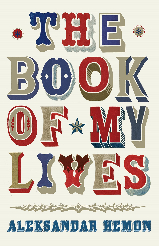On the evening of March 27, 1969, my father was in Leningrad, USSR, in pursuit of his advanced electrical engineering degree. My mother was at home, in Sarajevo, deep in labor, attended to by a council of her women friends. She had her hands on her round belly, huffing and crying, but the council didn't seem too worried. I was orbiting around her, exactly four and a half years old, trying to hold her hand or sit in her lap, until I was sent to bed and ordered to sleep. I defied the order so as to monitor the developments through the (somewhat Freudian) keyhole. I was terrified, naturally, for even if I knew that there was a baby in her stomach, I still didn't know how exactly it was all going to work, what was going to happen to her, to us, to me. When she was eventually taken to the hospital in obvious and audible pain, I was left behind with terror-provoking thoughts, which teta-Jozefina tried to counter with the guarantees that my mother would not die, that she would come back with a brother or sister for me. I did want my mother to come back; I did not want a brother or sister; I wanted everything to be the way it was, the way it already used to be. The world had harmoniously belonged to me; indeed, the world had pretty much been me.
But nothing has ever been—nor will it ever be—the way it used to be. A few days later, I was accompanied by a couple of adults (whose names and faces have sunk to the sandy bottom of an aging mind—all I know about them is that neither of them was my father, who was still in the USSR) to retrieve my mother from the hospital. One thing I remember: she was not half as happy to see me as I was to see her. On our way home, I shared the backseat with her and a bundle of stuff they claimed was alive—that was supposed to be my sister. The alleged sister's face was seriously crumpled, containing only an ugly, indefinable grimace. Moreover, her face was dark, as though she were soot-coated. When I traced my finger across her cheek, a pale line appeared under the soot. "She is filthy," I announced to the adults, but none of them acknowledged the problem. From thereon in, it would be hard for me to have my thoughts heard and my needs met. Also, chocolate would be hard to get.
Thus my sooty alleged sister's arrival marked the beginning of a tormentful, lonely period in my early development. Droves of people (bringing chocolate I couldn't touch) came to our home to lean over her and produce ridiculous sounds. Few of them cared about me, while the attention they paid to her was wholly, infuriatingly undeserved: she did nothing but sleep and cry and undergo frequent diaper changes. I, on the other hand, could already read small words, not to mention speak fluently, and I knew all kinds of interesting things: I could recognize flags of various countries; I could easily distinguish between wild and farm animals; cute pictures of me were all over our house. I had knowledge, I had ideas, I knew who I was. I was myself, a person, beloved by everyone.
